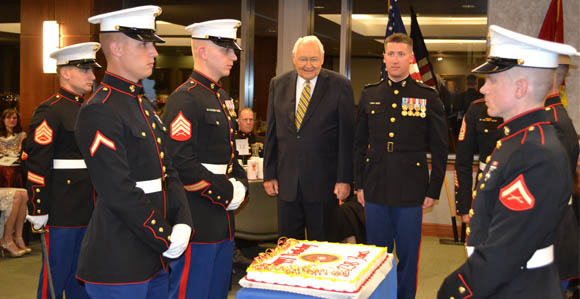Elder Perry Honored for Service in U.S. Marine Corps
Contributed By By Gerry Avant, Church News editor

Elder L. Tom Perry, center left, escorted by Captain Joseph R. Thiel, center right, participates in a cake-cutting ceremony at the 238th Marine Corps Birthday Ball on November 9, 2013, in Salt Lake City.
Article Highlights
- Elder L. Tom Perry was an honored guest and speaker at the 238th Marine Corps Birthday Ball in Salt Lake City, Utah.
- As a marine, Elder Perry was part of the first group assigned to occupy Nagasaki after the atomic bomb hit.
- While stationed in Japan and in Saipan, Elder Perry spent his free evenings building and reconstructing chapels.
“You will never forget standing at attention and seeing Old Glory hoisted up a rude-made flagpole on an island that has just been secured in the Pacific.” —Elder L. Tom Perry of the Quorum of the Twelve
Related Links
Elder L. Tom Perry was recognized for his service in the U.S. Marine Corps during World War II at a formal reception, dinner, and program on Saturday evening, November 9, in downtown Salt Lake City.
Elder Perry of the Quorum of the Twelve and his wife, Sister Barbara D. Perry, were honored guests at the 238th Marine Corps Birthday Ball, hosted by Fox Company, 2nd Battalion, 23rd Marines.
“I would like to say I have always been proud of the time I served in the Marine Corps,” Elder Perry said in remarks at the event.
He spoke of how the Corps helped him learn self-control, gave him opportunities to develop friendships and work experience, provided ways for him to serve others, helped him deepen compassion, and increased his love of country.
He was serving as a full-time missionary in the Northern States Mission when he received notice that he would be drafted into the military; he was home less than a month when, in 1944, he opted to serve with the U.S. Marine Corps.
During the Marine Corps anniversary celebration, Elder Perry, 91, delivered a message he titled “The Making of a Marine.” He spoke about how, through his military service, he learned self-control by training his mind to make his body do difficult things he wouldn’t ordinarily do.
He said the Corps helped him to establish good friendships with men among whom he served and civilians at his various postings.
After he completed boot camp he was stationed on the island of Saipan, where he reviewed casualty reports coming in from the front line and assigned incoming Marines to where they were needed.
“My experience in the Marine Corps in the office that I was a part of and the way we organized ourselves to do the work paid rich dividends for me throughout my business life,“ he said. ”It taught me the discipline I needed to get the work done on time, in an orderly and efficient way. This led to an early opportunity in my life to be made an internal auditor, which rapidly turned into an early assignment to be a controller, which led to vice president of finance and the chief financial officer in the firms I was with. I give much credit to that office organization that we had during those days in the Marine Corps.“
Of opportunities to give service beyond Corps duties, Elder Perry said a group of LDS men spent their free evenings building a chapel for their meetings on Saipan. They dedicated the chapel on a Sunday night. The next day they were aboard a ship when their unit was sent as the initial force to occupy Nagasaki, Japan.
“We were the first group to land in Nagasaki,” Elder Perry said. “We went in and saw the devastation that occurred as a result of the bomb. I will never forget that experience as long as I live. … We had such great compassion for the people that had suffered so much, especially there in Nagasaki.”
He said that at night they would hear children rummaging in garbage cans for food. The Marines cared for as many as they could but eventually realized they couldn’t help all the children. “We appealed to a group of nuns that had not been allowed to function during the war to set up an orphanage to take the little fellows we were bringing in.”
Elder Perry said that he had the opportunity to serve in the Corps with his former missionary companion. Together, they worked on various service projects in the evenings. With a group of Japanese people, they worked with two Protestant ministers whose buildings had been bombed and partially damaged; they replastered walls, painted, and got the chapels in condition for church services.
“I had the opportunity on the first Sunday there of being asked to speak,” Elder Perry said.
He described a scene that transpired on the day he left Nagasaki: “Some of us were being teased as we went to the train because a lot of the other Marines had their Japanese girlfriends with them saying good-bye. We were without anyone to wish us farewell as we were about to board the train. Just then, over the hill, came our congregation from the churches we put together, singing ‘Onward, Christian Soldiers.’ They came down and showered us with gifts. As we got on the train to leave, they stood alongside the tracks. We held our hands out the windows, just touching their fingertips, as the train picked up speed and we left on our return trip home.”
Elder Perry said that serving in the U.S. Marine Corps deepened his love of country. “You will never forget standing at attention and seeing Old Glory hoisted up a rude-made flagpole on an island that has just been secured in the Pacific,” he said. “You look around at those weather-beaten Marines, hardly a dry eye in the entire group as we saw Old Glory fly on the island of Saipan. That great love for country has continued.”
